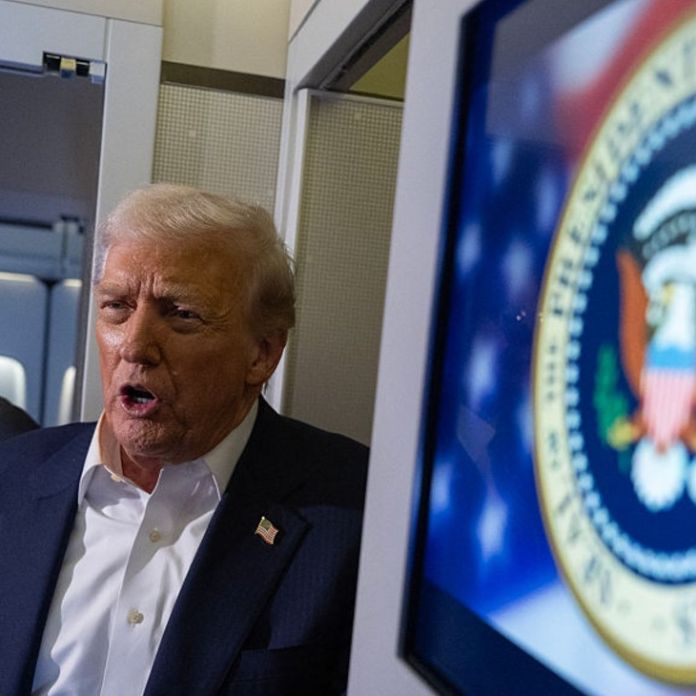Copyright NBC News

Welcome to the online version of From the Politics Desk, a newsletter that brings you the NBC News Politics team’s latest reporting and analysis from the White House, Capitol Hill and the campaign trail. In today’s edition, our Capitol Hill team reports on how Senate Republicans shot down President Donald Trump’s call to end the filibuster. Plus, Kristen Welker spoke with California Gov. Gavin Newsom about Democrats’ handling of the government shutdown. And I answer this week’s reader question on impeachment. Sign up to receive this newsletter in your inbox every weekday here. — Adam Wollner Shutdown, Day 31: Trump’s push to nuke the Senate filibuster hits immediate GOP resistance By Sahil Kapur, Ryan Nobles and Brennan Leach President Donald Trump’s push to abolish the 60-vote filibuster rule in the Senate to reopen the shuttered government without Democratic votes is meeting swift and firm resistance from his own party. “It is now time for the Republicans to play their ‘TRUMP CARD,’ and go for what is called the Nuclear Option — Get rid of the Filibuster, and get rid of it, NOW!” Trump wrote in a pair of late-night social media posts Thursday. “Well, now WE are in power, and if we did what we should be doing, it would IMMEDIATELY end this ridiculous, Country destroying ‘SHUT DOWN.’” Senate Republican leaders have been outspoken in their support for the 60-vote rule to pass most bills. Majority Leader John Thune, R-S.D., promised shortly after the 2024 election that the legislative filibuster would remain unchanged on his watch. “Leader Thune’s position on the importance of the legislative filibuster is unchanged,” Thune spokesperson Ryan Wrasse said. A spokesperson for Senate Majority Whip John Barrasso, R-Wyo., said: “Senator Barrasso’s support of the filibuster is unchanged.” The Senate, under the control of both parties, has eliminated the 60-vote threshold to confirm executive branch personnel and federal judges; those require a simple majority of the Senate. The legislative filibuster has evolved over the years, but since 1975 it has required 60 votes to achieve “cloture” in the Senate and ensure passage of most bills over the minority’s objections. There are exceptions, such as the budget “reconciliation” process that Republicans used to pass Trump’s Big, Beautiful Bill. GOP senators have expanded those exceptions this year, but they’ve largely been opposed to fully removing the 60-vote threshold. House Speaker Mike Johnson, R-La., said he understands why Senate Republicans want to preserve the filibuster. “It’s not my call. I don’t have a say in this. It’s a Senate chamber issue. We don’t have that in the House, as you know,” he told reporters. “But the filibuster has traditionally been viewed as a very important safeguard. If the shoe was on the other foot, I don’t think our team would like it.” Read more → Gavin Newsom says Democrats' health care demands are 'the right call' as shutdown drags on California Gov. Gavin Newsom said Democrats are leaning into the “right issue” amid the government shutdown, as the party holds firm on opposing funding bills without a deal to extend expiring health care subsidies. I sat down with Newsom at the California Democratic Party headquarters in Sacramento for an interview yesterday and asked him if the party had picked the right fight, with the shutdown on the verge of becoming a record-setting stalemate. “We’re fighting for the people that voted not just for our party and our values and principles, but voted for Donald Trump and his party,” Newsom said, noting rural areas and red states will be “disproportionately” affected by higher health care costs when the Obamacare subsidies expire. “We have their back,” Newsom said. “Donald Trump has betrayed them. He’s turned [his] back. The Republicans in Congress have turned their backs. ... Absolutely, it’s the right issue because it breaks through. At a time of great economic anxiety, the idea that you’re going to face a 100% to 300%-plus increase in your premiums in a matter of months is the issue that defines more issues in more ways, on more days, for more Americans. So it’s absolutely the right call.” As the shutdown drags on, crucial safety nets, including the Supplemental Nutrition Assistance Program, are at risk without federal funding. The U.S. Agriculture Department announced last week that assistance would not be distributed on Nov. 1, stating that contingency funds are “not legally available.” But a federal judge today ordered the USDA to distribute money owed to SNAP recipients “as soon as possible.” “I think it’s a disgrace. The USDA’s never done this in the past. They said they have a contingency fund for precisely this moment,” Newsom said in the interview before the judge’s ruling. Newsom also decried “unprecedented prices for beef, and coffee, and other basic goods” due to Trump’s tariff policies. He noted higher costs for candy ahead of Halloween and for toys ahead of the holidays, saying the higher costs amount to a “war on Christmas.” Asked if he is concerned Democrats could pay a political price amid the government funding fight, Newsom said, “I don’t think it’s about who’s to blame. It’s not about who’s up, who’s down. It’s about all of us. We’re all better off when we’re all better off.” Newsom called on Trump to negotiate with congressional leaders, saying, “You don’t get to do always what you want, Mr. President. It means you have to work with Congress. And right, you have congressional leadership, Republican leadership, that is completely supine. They’re appeasing this president. At least the Democrats are standing up for the people they represent in this republic, and what they’re asking for — overwhelmingly, the American people are asking for relief on health care costs.” “He was never serious about a deal. He wanted this shutdown,” Newsom later added, referring to Trump. “And if you think I’m overstating it, why was he golfing over the weekend before the shutdown? Why has he been overseas, the last week, cleaning up his own mess, as it relates to trade and tariff policies, and not negotiating in good faith, knowing Nov. 1 was around the corner? He’s not serious. He doesn’t want this shutdown to end. And that’s what we’re up against. And I think the American people understand that.” Tune into “Meet the Press” this Sunday for more of my interview with Newsom. We’ll also be breaking down the latest results of the NBC News poll with Steve Kornacki ahead of Election Day on Tuesday. More on the shutdown: Ground delays are hitting some U.S. airports that are experiencing a shortage of air traffic controllers, per Marlene Lenthang. The Trump administration plans to pay military members today by using a mix of legislative and Defense Department funds, Monica Alba and Courtney Kube report. Affordable Care Act open enrollment kicks off Saturday, and this year is expected to see the largest increase in costs since the law went into effect more than a decade ago, Berkeley Lovelace Jr. notes. ✉️ Mailbag: Will Democrats try to impeach Trump again? Thanks to everyone who wrote in! Here’s this week’s reader question: “Why aren’t the Democrats pushing to impeach Trump?” It’s a question Democrats have been wrestling with throughout Trump’s second administration. They don’t currently control the House, where impeachment proceedings begin, so it’s something of a moot point for now. But it may not be for long, as the party could be in position to win the majority in next year’s midterm elections. Rank-and-file Democratic lawmakers have tried on several occasions over the past year to force the House to vote on impeachment resolutions that have split the party. Some on the left view impeachment efforts as a tool to energize members of their grassroots base who want the party to fight Trump at every turn, as well as a way to hold the president accountable. But other Democrats see these resolutions as futile actions that only serve as distractions and help unite Republicans. The issue will become more real if Democrats manage to take back control of the House for the remainder of Trump’s second term. But even if Democrats were to pursue a successful impeachment push, they would face the same hurdles in the Senate they did when they impeached Trump twice during his first term. While an impeachment vote can pass with a simple majority in the House, a conviction requires the support of two-thirds of senators, meaning a sizable group of Republicans would need to be on board to remove a president of their own party from office. That’s all From the Politics Desk for now. Today’s newsletter was compiled by Adam Wollner and Owen Auston-Babcock. If you have feedback — likes or dislikes — email us at politicsnewsletter@nbcuni.com



